

Displaying 101 - 110 of 307
This qualitative study explored the accounts of 50 residential childcare staff in Saudi Arabia, aiming to identify ways in which staff and residential institutions may function as attachment objects for the children in their care.
This study examines the link between perceived staff social support and emotional and behavioral adjustment difficulties of adolescents in educational residential care settings (RCSs) designed for youth from underprivileged backgrounds in Israel.
This report from the UN Office of the SRSG on Violence against Children explores repatriation, rehabilitation, and reintegration of foreign, Iraqi and Syrian children who are being held in detention on suspected ISIS association or terror-related offenses, or in camps.
The provision of material assistance, which is widespread in child protection settings, has received negligible scholarly attention. This article aims to describe and conceptualize this underresearched practice and to explore the challenges workers face when implementing it. The study described here included 20 in-depth interviews conducted with social workers working in an innovative Israeli child protection program called Families on the Path to Growth.
This report presents the results of multi-country research launched in 2018 on refugee data in Egypt, Jordan and Lebanon to study the impact of cash-based interventions (CBI) on child protection outcomes.
This guidance provides a short overview of the child protection (CP) risks associated with disease outbreak.
This guidance note details the four priority areas that case management agencies will need to focus on in the coming days and months during COVID-19 for child protection.
This report presents results from a survey administered to graduates of the Child Protection in Emergencies Professional Development Programme (CPiE PDP) in the Middle East and Eastern Europe region to evaluate if and how the CPiE PDP has influenced their professional development and to what extent the graduates have practiced what they have learned.
Drawing on qualitative research undertaken with adolescents with disabilities from refugee and host communities in Jordan and the State of Palestine, this article critically interrogates the framing of child neglect, which to date has situated the state as a protector rather than a perpetrator, the narrow understanding of adolescent needs and the responsibility of international actors for ensuring that the full range of human rights of adolescents with disabilities is supported.
This essay provides an overview of an alternative to the traditional model of social work that was developed in the context of an initiative seeking to address the community-level factors shown to influence children’s safety. The model described in this essay was part of an effort to replicate Strong Communities for Children (Strong Communities)—which was first piloted in the USA to keep children safe by building systems of support for parents with young children —in south Tel Aviv, Israel.






